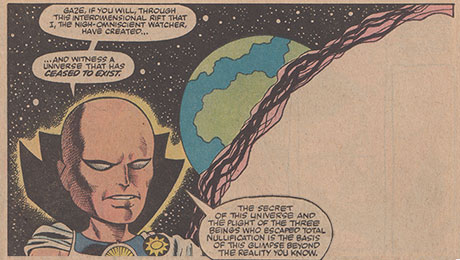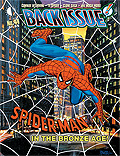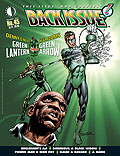Superman: Peace on Earth (January 1999)
"Superman: Peace on Earth"
Paul Dini-Alex Ross
NOTE: Due to the size of this book, there was simply no way to get entire pages scanned on the equipment we own. In some cases, even individual panels had to be compromised. We regret any inconvenience toward your viewing pleasure.
Karen: As we head into a new year, hopeful that it will be better than the previous one, we conclude our review of this beautifully illustrated story that has more than a little to do with hope and faith. Superman has taken on the herculean task of attempting to feed the world's hungry for a day, and after his first couple of stops, he feels like he's made the right decision. The people he's encountered so far are grateful and happy to receive his help. But things swiftly change when he delivers his cargo of food to an unnamed war-torn European country, where the gray-garbed people eye him with suspicion. They silently accept the packages he hands out, except for one small boy, who asks the Man of Steel, "Will you come back tomorrow?" Superman has to turn away.
Doug: It's here, in the second half of the story, where we begin to be able to place ourselves in the story. Superman, in today's first scene, has obviously landed somewhere in a war zone in what used to be Yugoslavia. While no mention is made of the political factors that led to the genocide, Dini's minimalist script gives us a very real impression of what has gone on. And the comment from the small boy just breaks the heart -- not only of the reader, but of Superman himself. I think this tiny vignette does many things. It contrasts the "localness" of Superman being able to check in on the young girl from he'd assisted at the beginning of the tale by taking her to a Metropolis shelter for rehabilitation and care with the needs of a very similar youth on the other side of the planet. While Clark Kent is indeed a Superman, he's never been able to be in two places at the same time, and this weighs on him. And in the contrast I've also brought forth a comparison -- hunger is universal, and not so easily fixed. In setting a goal to end "world hunger", Superman has discovered that "world hunger" is indeed made up of millions of individual stories.
Karen: Superman flies huge cargo ships full of grain and other foodstuffs across the globe; the scenes of him holding the ships above his head are really impressive. By the middle of his day, he returns to Africa, determined to reach as many remote villages as he can. As he hands out rice, he realizes that the vast crowds moving across the dry land have started a brush fire. Superman streaks off toward the fire and discovers that not only is there a fire, but it's caused a bunch of animals to stampede straight towards the village. OK, this is hokey but I loved it. It reminded me of something you might see on one of the old Superman cartoons from the 60s. Besides, Ross does a great job drawing elephants, zebras, lions and all other sorts of critters. Superman uses his body to dig a trench in front of the panicked beasts. Most turn around, but a few continue forward, and so we have some exciting shots of Superman man-handling an elephant, a rhino, and a lion. He flies off to a near-by lake and funnels the water over to put out the fire. With the situation in hand, he returns to distributing food.
Doug: Paul Dini, in just a few sentences (Superman's musings on helping everyone for just one day even though he knows they need more), says what political authors have filled volumes with: "I know at best this will provide only a day's relief for people who need so much. But perhaps that's what's needed to start the rest of the world thinking about a permanent solution." It's probably no mistake on the part of the creators that the setting for these lines is southeast Asia, where the Second World nations continue to pile up human rights violations while keeping the masses in Third World poverty.
Doug: In a totally different mood, I am reminded of the wonderful scene we showed two weeks ago in our review of Silver Surfer #4, when Norrin Radd reclines with the animals of the African wild. Ross's representation of the same creatures is a breathtaking as that of Big John Buscema.
Karen: But the animals Superman faced in Africa were nothing compared to the inhuman creatures he would face next. In what appears to be somewhere in east Asia, Superman enters into a stand-off with a military dictator. On one side of a river are the desperate, hungry people of that country. On the other, the dictator and his army. The dictator thanks Superman and tells him that he and his troops will distribute the food. Of course, Supes knows darn well that the man has no intention of giving the food to those who need it. Instead, it will most likely keep it for himself or resell it. The Man of Steel asks to hand it out himself, and then finds the soldiers' rifles trained on the innocents. The dictator says he won't have Superman inciting a riot. Ross does a nice job here with Superman's facial expression; he's both stoic and contemptuous all at the same time. Superman quickly tosses the food on the side of the river with the civilians. The soldiers open fire but he blocks their bullets with his body and uses his heat vision to melt their rifles. But the dictator ultimately wins this round: he knows that Superman would have to leave eventually, leaving these people vulnerable to his retribution, and Supes knows this too. He leaves without handing the food out.
Doug: I wondered if Superman had landed in North Korea in this part of the story, as the previous scene from SE Asia seemed to have referenced China or Vietnam. The creators do a service in not naming any person or nation specifically, but the implications are pretty clear. You know, even though this scene is only a few pages long, there is great tension here. And how do you think Superman felt? He could have taken this guy out in any number of ways, and in an almost-instant fashion. Yet he stays true to his moral code, lets the guy have his day, and then brings succor to the people anyway. I love the panel you cited where Superman stops the bullets and uses his heat vision -- Ross has always been dynamite at depicting that power.
Karen: From his initial hopeful position, Superman gradually finds himself feeling more discouraged, as he delivers food to cities with empty streets, the hungry residents too fearful to come out of their homes to accept the food he brings. In other places, he is actually pelted with rocks and regarded as a political enemy. In a particularly harrowing scene, Superman lands in a country where the people have become nearly mad with hunger. They surround and swarm over him, and he has to perform one of his patented "drill through the Earth at super-speed" moves to escape.
Doug: Again, Dini's words are as pretty as Ross's pictures. On the page you reference: "Oppression breeds a spiritual starvation all its own... I can't overcome their generations of fear any more than I can force them to accept what I've brought." And... "Their rocks shatter as they hit me or bounce harmlessly aside. Every one hurts." I don't know that Superman has ever felt that outsider complex, as maybe Spider-Man or the X-Men have. "Every one hurts."
Karen: On his last run of the day, Superman once again carries an enormous cargo ship overhead, only to have it dramatically blown up by a missile launched by a belligerent nation below. Not only do they completely destroy the ship, they also release a deadly gas which poisons the grain, despite Superman's best efforts to sweep the gas away. He lands amidst the wreckage of the ship and its contents, and sits, defeated, sifting the ruined grain through his fingers.
Doug: With the mention of poison gas, should we assume that this was the regime of Saddam Hussein? The panel where Ross shows Superman flying at super-speed to dissipate the gas is incredible. The last scene where Superman sits amidst the spoiled grain is similar to panels of abject defeat we've witnessed before -- Captain America at the end of the "Under Siege" storyline, Batman at the death of Jason Todd...
Karen: Back home in Metropolis, Clark sits in his apartment and ponders his failed mission. He feels badly for the millions of people who he couldn't help. He wonders how he thought he could really succeed. And then he begins to wonder if he was taking the right approach to things after all. He goes for a fly in the night air to clear his head, and then "gives an interview to Clark Kent", to try to explain what he was attempting to do. He says that he realizes that the task of taking on hunger was too much for any one man, even him. Besides the hunger he encountered, he also encountered terrible poverty, particularly in some men's souls. Superman says that if there is a solution to world hunger, it must come from the compassionate heart of mankind, and a willingness to reach out and share one's knowledge, time, and generosity. There is a beautiful shot here of Superman in space over the rim of the blue Earth and it reminds me a lot of the Christopher Reeve Superman films.
Doug: The word messiah means "annointed one", and there have been many to have claimed to be, or were claimed to be, messiahs throughout Jewish history. Yet the Christian use of the term is of course more specific to one man, and to the prophecies that He will one day return to Earth. Dini ventures into this territory on the page where Clark sits alone: "Most of all, I feel the disappointment of millions who still look skyward, yet know in their hearts I won't be coming. Did I truly think I would succeed? Knowing what I do of human nature, why would I believe everyone would willingly accept what I had to give? Then again, maybe I wasn't giving the right gift."
Karen: There's no doubt that implication was intentional. The Superman movie of course, made it even more obvious when Jor-El talks about sending his "only son" to help the people of earth. It's hard not to see Superman as a Christ figure. The man become God and vice versa. On the last page of the story, it is now spring, and we see Clark with a group of young school kids at a farm. Just as his father showed him when he was a child, so he shows them now how to spread seeds in the rows, so that each has a chance to grow.
Doug: "...if you give a man a fish he is hungry again in an hour; if you teach him to catch a fish you do him a good turn." -- attributed to Anne Isabella Ritchie, Great Britain, c. 1885.
Karen: All in all this was a very enjoyable read. I thought they captured the essence of Superman (as I see it) very well. Despite his great powers, even Superman can't solve this terrible man-made problem (which is as it should be). At best, he can inspire people to do better. And in the end, he follows his own advice, in his human identity of Clark Kent, by working with a group of schoolkids to share what he has learned about how to grow food. You can't help but think that perhaps this smaller, more modest gesture will be the one to bear more fruit.


























































8 comments:
Not a big fan of this current stuff, but readily you see the story concept lifting itself far off the mere exquisite art and writing.
Such a universal (if not naive) struggle to offer goodness in the world by simple solutions, splintered by human failings such as anger, anguish and suspicion. A true testament to the human condition and the world we 'actually' live in, where good gestures, coupled with superstrength, just isn't enough.
More fantastic Ross images and good review. I think Ross and Dini achieved something great with these books.
Hope to see reviews of JLA, Shazam, Batman in this series! I haven't read Wonder Woman yet.
The art in this story is fanastic of course, though my one quibble is that Ross draws the \S/ so big it looks as though it threatens to swallow Superman up into itself.
This book is also one of few instances of comicbook creators doing something topical and handling it in a way that doesn't break the fantasy of the superheroic character or coming off with that "..and now a very special episode of.." vibe. Even though I guess it kind of is.
Obviously, DC can't have Superman going around solving all real world problems because this would change the worldsetting of the comics to a degree that would be almost unrecognizable as being similar to ours. The other problem is the simple fact that those same problems will still be here when we wake up on the morning long after we've finished the comic.
Peace On Earth is a good way of crafting a kind of "in-story" reason why Superman can't solve those kind of problems which works both in and out of the comicbook context: world hunger is to vast and complex for him to just swoop in and solve it. The idea that he can better effect the problem as Clark is an excellent way of showing that we who cannot fly or shoot lasers out of our eyes can effect it to.
Look forward to other reviews of the Dini/Ross books.
At one point I had all of the Dini/Ross books like this one. I got rid of them because I didn't really care for them all that much for some reason. Maybe it was because they were a little too "After School Special" for my tastes, I don't know. I guess the art was pretty nice, but to tell you the truth, I get a little tired of Ross' ultra-realistic style after a while. To me, it starts to look kind of like a bad TV show. And his Superman reminds me of some 45 year old dude who sells insurance or something.
I will shut up now.
Isn't it funny how personal tastes go? I know we've had several commenters on the BAB who just love Frank Robbins and Gil Kane (Kane's an acquired taste for me; Robbins -- never in a million years). Conversely, I love Alex Ross's art, and personally want to cry "Heresy!!" at the haters.
And I would buy anything that insurance agent tried to sell me...
Doug
david_b....what in incredibly predictable, douchey comment. Though not unexpected from someone who identifies with the "government" industry. I imagine your that guy that never actually created anything and just tells everyone how to do it "better". Or, worse yet, you dabble in this world but carry a grudge when nobody else recognizes your brilliance. Fact is, simplified solutions are what many of us believe in. The world of today has been made to be a meticulous, overly-detailed and sensitive nest of hurt feeling, unnecessary sensitivity, and self entitlement in order to support the need for a bureaucracy. On the other hand, this is a "comic book", it aint real fool. Its an escape from reality, to a much easier and better place. The artistic interpretation of Superman in this is now my favorite. There is a "realism" to the way his face is structured. To the weight of him. He looks like a real New Jersey truck driver, instead of some hollywood pretty boy. Truly a masterpiece.
Steve --
First off, welcome -- I think this is your inaugural comment.
However, that being said I think you've made quite a splash. While you're certainly entitled to your freedom of expression, I'd personally invite you to state your feelings sans name-calling and other extemporaneous adjectives. We all enjoy the potential for disagreement, but we do it civilly.
Simply, play nice. Over the past four years Karen and I have worked diligently (as have our regular readers/commenters) to make this a haven from other blogs and message boards that tend to have conversation of a coarser variety.
Best,
Doug
Steve, you're obviously new to BAB, so I'm not sure where all this animosity is coming from, but we run a pretty peaceful blog. It's perfectly fine to disagree with someone's point of view, but personal attacks are another thing entirely, and aren't tolerated around here. I'm sure you can get your point across without attacking another poster.
Post a Comment